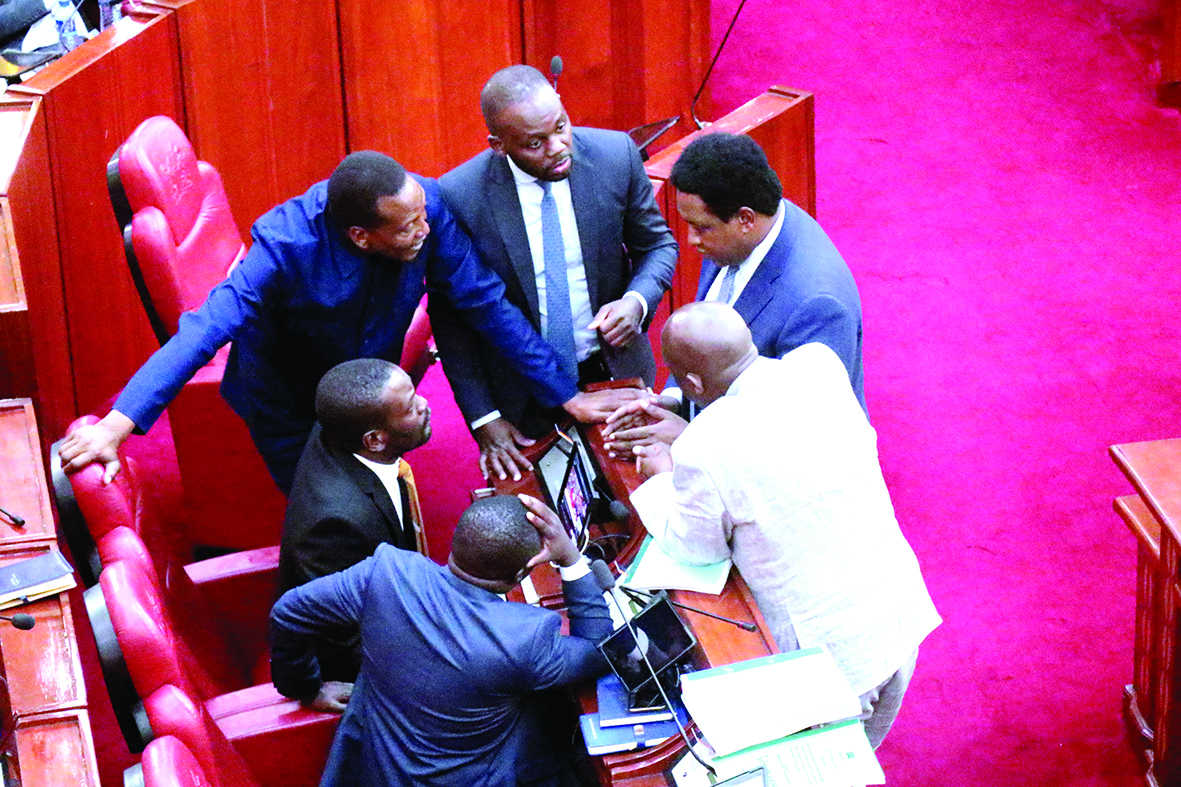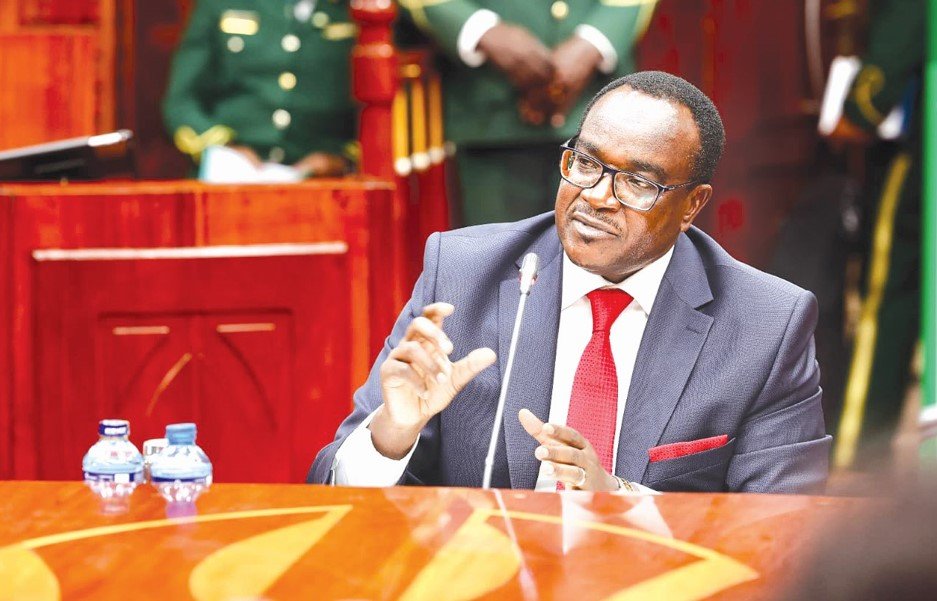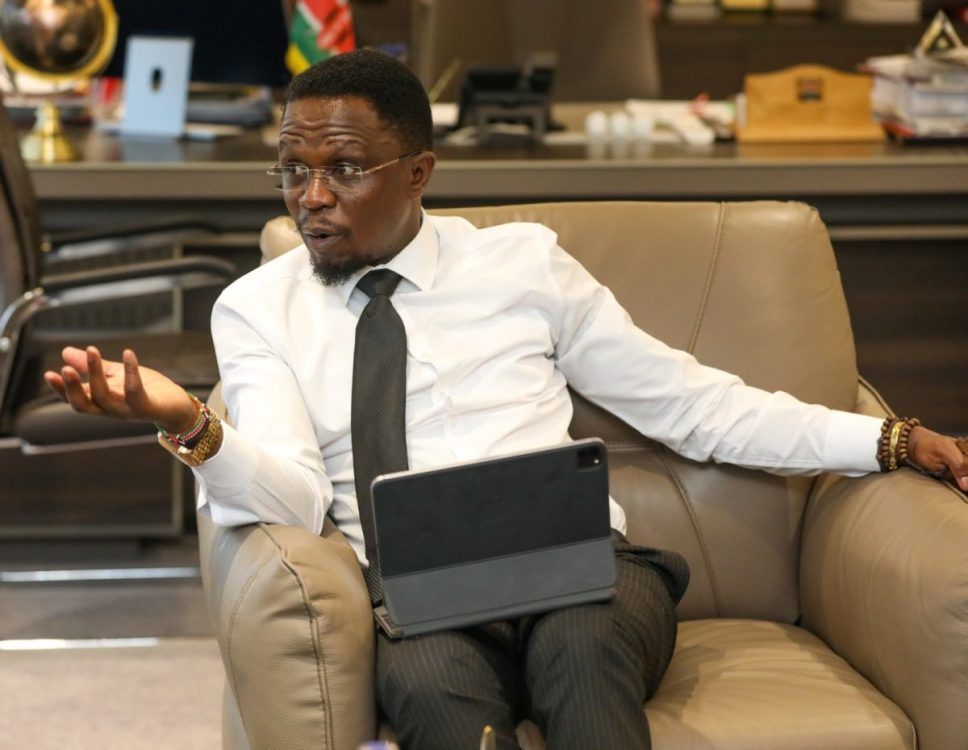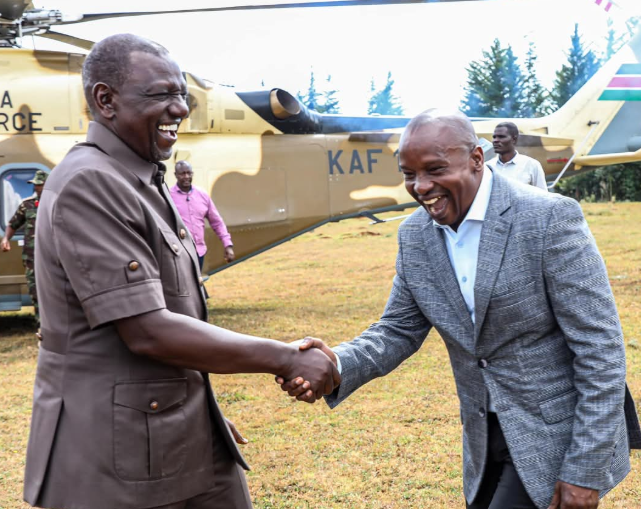DP no-show but Senate decides to continue trial

Deputy President Rigathi Gachagua stunned lawmakers yesterday when he failed to turn up for cross-examination by lawyers representing the National Assembly.
Gachagua, who was expected to take the witness stand, was conspicuously missing when the afternoon session resumed at 2.30pm, with his lead lawyer Paul Muite leaving the chambers to go find him.
Moments later, Muite reappeared to inform Speaker Amason Kingi that he had learnt that his client had fallen suddenly ill and had been rushed to hospital.
The news appeared to throw the Senate into confusion, forcing Kingi to adjourn the session so as to allow defense lawyers to get an update on the DP’s condition before the House decided on its next course of action.
Chest pains
When the session resumed at 5pm, Muite informed senators that he had spoken to one of the doctors attending to Gachagua at Karen Hospital and that the DP was suffering from severe chest pains and was required to take a rest and could not attend the session.
Muite said: “[Because of the DP’s] condition, I was not able to directly talk to him on the advice of his doctors, who said he must have complete rest for the time being. I was, however, informed by his doctors that he’s currently suffering intense chest pains. I did not want to inquire beyond that.”
He proceeded to ask the Senate to adjourn the session until Tuesday next week, promising to provide an update on the DP’s condition at that time.
Muite said he was unable to get a medical report from doctors to prove that his client had fallen ill and asked senators to postpone the sitting.
“I would suggest Article 145 sub-article 6 (b) doesn’t have a time limit of 10 days. Give the Deputy President – in the interest of natural justice and given the weight of removing him from office – a couple of days, say up to Tuesday. We will be able to know when the Deputy President is ok,” he went on.
But the request was rejected by the National Assembly’s legal team, led by Siaya Governor James Orengo and Eric Gumbo, with the former demanding proof that the DP had indeed been taken ill.
Gumbo, although sympathising with Gachagua’s condition, pleaded with senators to allow the matter to proceed to conclusion, arguing that the DP had already filed his submissions.
The lawyers told senators to apply Rule 11 of the Senate, which allows such proceedings to continue whether the witness appears for them or not.
Orengo argued that because they were bound by time, they were ready to forfeit their re-examination and use the submissions that Gachagua had filed.
He said: “Because we are time-bound, we are prepared to go down with the evidence on record, the prejudice is on us because we cannot test on pre-examination but we want to proceed.”
He argued that they should proceed with the hearing as Muite had not provided medical evidence of the DP’s sickness. They also said they were not sure whether Gachagua would get better by Tuesday.
He said: “For the DP to fail to bring evidence that he has been admitted to a medical institution, we would rely on the evidence from senior counsel Muite. We should have had one of the doctors here to tell us about his admission and condition.”
He added: “[Having failed to get] medical evidence from a medical institution that he had been admitted to, we are relying on the sentiments by Muite, but in practice we have seen many cases that brought medical evidence [that was found to be fake].
“We should have had one of the doctors to tell us about his condition and admission. Up to 1.15pm, he was here and was not evacuated in an ambulance. He went to his office and there is no evidence that he was evacuated in an ambulance, and he took himself to Karen Hospital.”
Orengo added that though he empathised with the DP, his action was “opportunistic”. “I saw him earlier and there was nothing to suggest the condition the senior counsel is saying,” he said.
Gumbo also insisted that they should proceed with the hearings as issues touching on the health of a person were beyond their control.
He said: “We would also be cognisant of the fact that we are dealing with a constitutional moment and whose timelines are constitutional. Contrary to what learned counsel Mr Paul Muite would want to persuade this House to believe, the proceedings of this House have not been the subject or have not been transacted pursuant to Article 145 (6).”
He added: “We are willing to take the painful decision to forgo the cross-examination of the DP and only proceed with highlighting submissions in relation to the documents we have filed before this house.
“It is our humble view that no prejudice would have been occasioned by the DP. Let me end by drawing the attention of this House to Rule 12 of the rules governing the proceedings currently underway.
“Rule 12 … dictates that once the hearing has commenced, it shall proceed up to the end. It does not provide for an option for the House to adjourn. I urge you … that we proceed with the hearing.”
Procedural motion
At that point, Kingi called for a five-minute adjournment to allow him to make a considered ruling on a way forward.
When he returned, Kingi announced that the House would proceed to debate a procedural motion on whether to adjourn the session and return to the House on Saturday, the final day of the 10-day window granted by the Constitution to debate a motion to impeach a President or Deputy President.
The motion was moved by Senate Majority Leader Aaron Cheruiyot and seconded by his Minority counterpart and Kilifi Senator Stewart Madzayo.
When put to a vote, the overwhelming majority voted “Nay”, allowing the Senate to proceed with debate and a vote on the DP’s impeachment.
Immediately after the vote, Muite and his team of lawyers recused themselves from the sittings and declined to give their closing remarks on the matter. They argued that their client had not given them the authority to deal with the matter.
That allowed lawyers for the National Assembly to give their closing remarks.
Said Muite: “Mr Speaker, following the decision of the senators, we would like to request that we recuse ourselves from these proceedings.”
Gachagua had been present in the Senate since the proceedings against him started on Wednesday and had sat through the entire proceedings.
Muite referred senators to Article 145 (6) of the Constitution, which provides that if the special committee reports that the particulars of any allegations against a President or a DP have been substantiated, the Senate will accord the President an opportunity to be heard on the impeachment charges.
He said it was important for Gachagua to give evidence in person as this will enable senators to gauge his demeanour.
He said: “It is important for senators to see with their own eyes the impressions of a witness. Once they do this, this can enable them to make a decision of whether this witness is believable or not if they see their demeanour.
“There are many witnesses who give their statements, but when they give their statements orally things can change. The DP wishes to make a statement on oath before the Senate.”
He added: “We are aware that this honourable Senate made a decision to hear the charges in plenary. This House is obligated by the Constitution to accord the DP an opportunity to be heard.”








